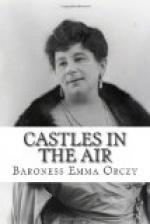In that happy frame of mind I reached the front door of my dingy abode. Imagine my surprise on being confronted with two agents of police, each with fixed bayonet, who refused to let me pass.
“But I lodge here,” I said.
“Your name?” queried one of the men. “Hector Ratichon,” I replied. Whereupon they gave me leave to enter.
It was very mysterious. My heart beat furiously. Fear for the safety of my precious papers held me in a death-like grip. I ran straight to my room, locked the door after me, and pulled the curtains together in front of the window. Then, with hands that trembled as if with ague, I pulled aside the strip of carpet which concealed the hiding-place of what meant a fortune to me.
I nearly fainted with joy; the papers were there—quite safely. I took them out and replaced them inside my coat.
Then I ran up to see if Theodore was in. I found him in bed. He told me that he had left the office whilst my visitors were still with me, as he felt terribly sick. He had been greatly upset when, about an hour ago, the maid-of-all-work had informed him that the police were in the house, that they would allow no one—except the persons lodging in the house—to enter it, and no one, once in, would be allowed to leave. How long these orders would hold good Theodore did not know.
I left him moaning and groaning and declaring that he felt very ill, and I went in quest of information. The corporal in command of the gendarmes was exceedingly curt with me at first, but after a time he unbent and condescended to tell me that my landlord had been denounced for permitting a Bonapartiste club to hold its sittings in his house. So far so good. Such denunciations were very frequent these days, and often ended unpleasantly for those concerned, but the affair had obviously nothing to do with me. I felt that I could breathe again. But there was still the matter of the consigne. If no one, save the persons who lodged in the house, would be allowed to enter it, how would M. Charles Saurez contrive to call for the stolen document and, incidentally, to hand me over the ten thousand francs I was hoping for? And if no one, once inside the house, would be allowed to leave it, how could I meet Mlle. Geoffroy to-morrow at two o’clock in my office and receive ten thousand francs from her in exchange for the precious paper?
Moreover the longer the police stayed in this house and poked their noses about in affairs that concerned hardworking citizens like myself—why—the greater the risk would be of the matter of the stolen document coming to light.
It was positively maddening.
I never undressed that night, but just lay down on my bed, thinking. The house was very still at times, but at others I could hear the tramp of the police agents up and down the stairs and also outside my window. The latter gave on a small, dilapidated back garden which had a wooden fence at the end of it. Beyond it were some market gardens belonging to a M. Lorraine. It did not take me very long to realize that that way lay my fortune of twenty thousand francs. But for the moment I remained very still. My plan was already made. At about midnight I went to the window and opened it cautiously. I had heard no noise from that direction for some time, and I bent my ear to listen.




